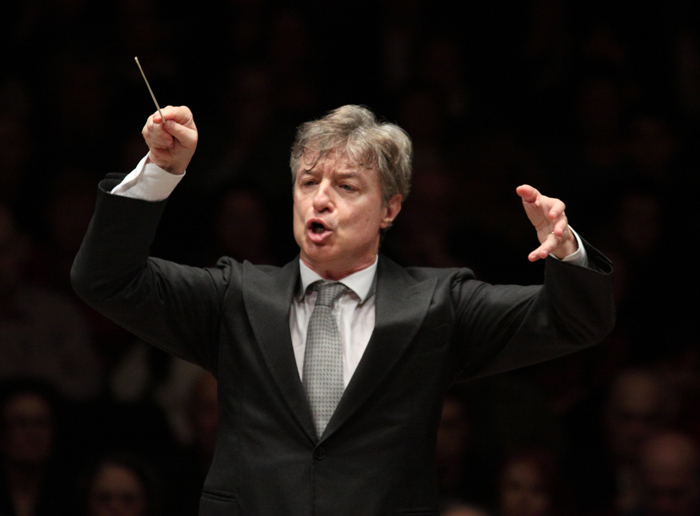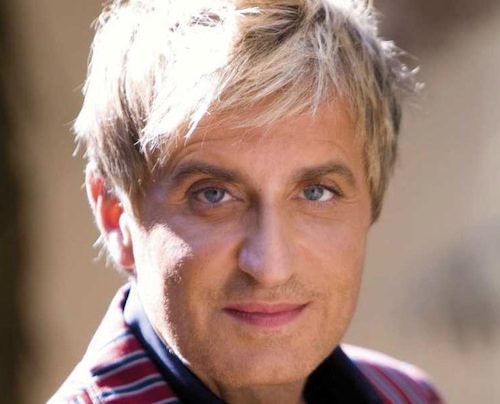Abbado brings idiomatic intensity to New World’s French-American program
On the right night the New World Symphony can play with the polish and brilliance of the best American orchestras. With Roberto Abbado on the podium at the Arsht Center, Saturday was one of those nights. The players of the orchestral academy were in peak form for a program of French and American works.
Debussy’s Prelude to the Afternoon of a Faun was the delicate, impressionistic opener. The languid score abounds in alternating whispers and splashes of orchestral color. Abbado brought clarity and strong definition to the wind and horn parts. The two harps were given special presence and the solo flute line was clean and precise. Abbado’s taut approach allowed the music to flow naturally without exaggerated solemnity.
The work of a 26-year-old composer, Berlioz’s Symphonie fantastique revolutionized orchestral writing. It would be difficult to imagine the symphonies of Mahler, Sibelius or Shostakovich without Berlioz’s pathbreaking work. Written only a decade after Beethoven’s Ninth Symphony, the score inhabits a very different musical sphere. The programmatic work pictures an opium nightmare of a young artist – a surrogate for Berlioz himself–who has an obsession for a young woman that will lead to his execution and her turning into a witch celebrating his demise. Berlioz’s score is rich in melody and colorfully extravagant orchestral effects.
Abbado and the New World players gave a stunning reading of this symphonic showpiece. After a deliberate beginning, the opening movement (“Reveries-Passions”) was played with an almost operatic sense of lyricism. Abbado kept strong control over dynamics and phrased the “idée fixe” motif with admirable restraint. Textures were never murky and the entire ensemble played with disciplined precision. The horns assayed their exposed parts with especially rounded tone and solidity.
There was a touch of the sinister in the waltz of the second movement with the strings’ rubato heavily accented. In the “Scene in the Country” the offstage oboe emerged plaintive yet clear and distinct. String tone was silky and transparent and the darker sonority of the cellos and basses was given due prominence.
The beautifully rendered first three movements were a mere prelude to the hair-raising account of the “March to the Scaffold” which reached fever pitch. Abbado superbly balanced the unison brass, playing with intensity that never turned to harshness. The five percussionists raised the roof in their climactic flourishes. From the grim initial rumblings, the “Dream of the Witches’ Sabbath” was paced at lightning clip with the beloved’s theme now turning into a caricature through the dancing wind lines. Abbado turned up the voltage even higher for the frenzied concluding section.
Special credit to Jarrett McCourt and Charles Goodman, the two tuba players, who gave tonal heft and power to the motif theme which sounded ominous indeed. Amid all the orchestral firepower, the string figures came through clearly–a tribute to Abbado’s masterful ear for instrumental textures and the fine acoustics of the Knight Concert Hall.
Between the two French scores, Jean-Yves Thibaudet was the soloist in a highly charged and idiomatic performance of George Gershwin’s Piano Concerto in F Major. Perhaps it is not surprising that this superbly gifted French pianist would play Gershwin with the breezy abandon and aplomb of a born jazz artist. From the first crisp timpani rolls, it was obvious that this performance was going to have plenty of snap. Thibaudet’s perfect melding of Gallic lightness with a bluesy touch spotlighted the opening Allegro. He gave subtle coloration to the nocturnal musings of the Adagio and marked the livelier sections with quirky verve.
The final Allegro agitato gave Thibaudet a chance to display his virtuosic chops. He leapt through Gershwin’s arpeggiated pages at dazzling speed and Abbado and the orchestra were in synch with him all the way. The Italian conductor led Gershwin’s music with such energy and jazzy insouciance that one would think he had made a career playing Gershwin’s Broadway scores. This versatile conductor should be a more frequent New World visitor.
The New World Symphony season continues with Michael Tilson Thomas conducting Mahler’s Symphony No. 5 and Mendelssohn’s Violin Concerto with soloist Christian Tetzlaff 8 p.m. Saturday and 2 p.m. January 22 at the New World Center in Miami Beach. The Saturday performance is sold out but there will be a Wallcast in SoundScape Park. nws.edu; 305-673-3331.
Posted in Performances
Leave a Comment
Sun Jan 15, 2017
at 12:22 pm
No Comments


